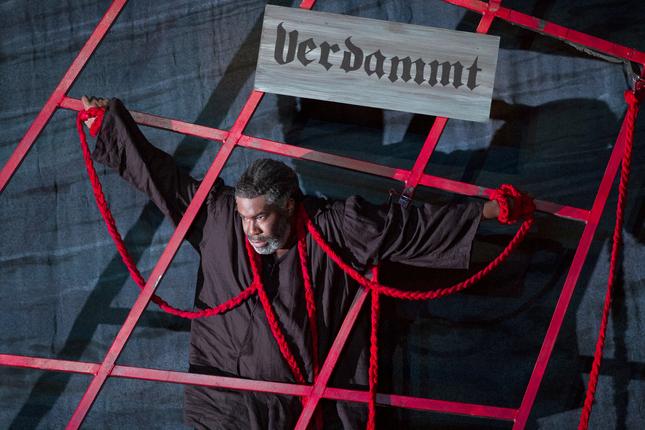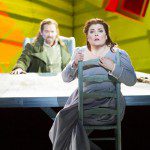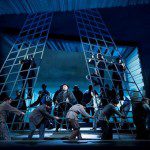‘Flying Dutchman’: Damned With Desire and Worth the Trip
By • March 11, 2015 0 1326

For opera lovers, salivating at the thought of the Ring Cycle being produced by the Washington National Opera next spring—and for those less familiar with the Richard Wagner experience—the WNO’s current production of “The Flying Dutchman” aka “Der Fliegende Hollander”) at the Kennedy Center’s Opera House offers a more focused, stirring taste of Wagnerian delights and challenges.
“The Flying Dutchman” was Wagner’s fourth opera, and he had not yet dipped full tilt into Germanica, but many of the signs of style and stirrings are already here—the wave or orchestral genius here and there, the embrace of myth and general bigness of themes, even in the less than Valhalla setting of a small Nordic port, the outpouring of emotions, in the music and the libretto.
In a production that’s nearly two and a half hours long without intermission, the challenge is self-evident, it has aspects of a marathon for the audience. It requires endurance as well as desire.
Let me say, with few reservations, that the trip is worth it , even if you’ve taken it before. Chief among them is American bass-baritone Eric Owens, a rising star in the opera and classical music firmament, who makes the part of the Dutchman, the nearly mad, deathless captain of a haunted ship, searching for a faithful woman who will break the curse of his existence, very much his own, vocally and emotionally. He has the size, the charisma and stride to match the demands of the part and to bring out his humanity, because this is a man roiling in grief and loss, longing for both love and death.
The part needs a partner in the role of Senta, the daughter of a local captain who’s basically promised her to the Dutchman, even though she retains some interest in an old swain, the huntsman Erik. In German soprano Christiane Libor, he’s got a perfect mate, a woman who desperately wants to free him from his curse, quite often punctuated by an unerring ability to reached emotionally rending high notes, in their one-on-one encounters.
The part of the Dutchman is full of temptations, not the least of which is to make it full of sound and fury. Owens resists the temptation and finds the right notes for grief as well as fury, not an easy task when singing in German.
This production, again directed by Stephen Lawless, is in outline and tone, the same as the one he directed here in 2008. Again, we have the Dutchman’s startlingly outlined red ship, his rather strange entrance in the ropes of the ship, bearing a sign that reads, “Verdammt” (German for “damned,” but cursed all the same). He offers the captain a ship heading for port a fortune for the hand of his daughter.
Wagner was already flying with “The Dutchman,” the libretto—he also wrote it along with composing the music—is replete with an accumulation of exclamations and outbursts of emotion. Lawless’s staging includes the arrival of ghostly women coming off the ship—women cursed for not fulfilling fidelity. There are beautifully lit scenes in the town, women around a table knitting, awaiting the arrival of the seamen, the sailors and townspeople celebrating, scenes that provide a respite from the Wagnerian emotional angst embraced by the Dutchman and Senta.
It’s important, too, that conductor Philippe Auguin in the overture and throughout the evening provides the necessary stormy sometimes overwhelming surging of Wagner’s music that is the set as well as the mind-and-heart set of the opera. Anyone who saw the WNO’s epic “Tristan and Isolde” will recognize the signs. For the rest—whatever flaws there are in this production—resistance in the end is futile. The force, Wagner (and Owens) is with you.
“The Flying Dutchman” at the Kennedy Center Opera House: Eric Owens sings the part of the Dutchman March 9, 13, 15 (a matinee), 19 and 21; Alan Held will perform March 11, joined by Jennifer Root as Senta.
- Eric Owens as The Dutchman | Scott Suchman for WNO






